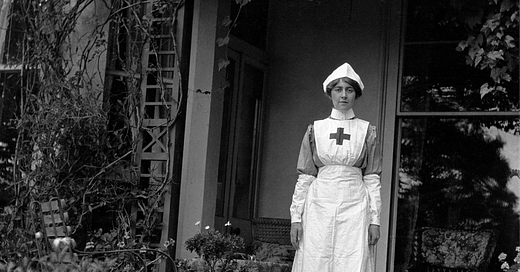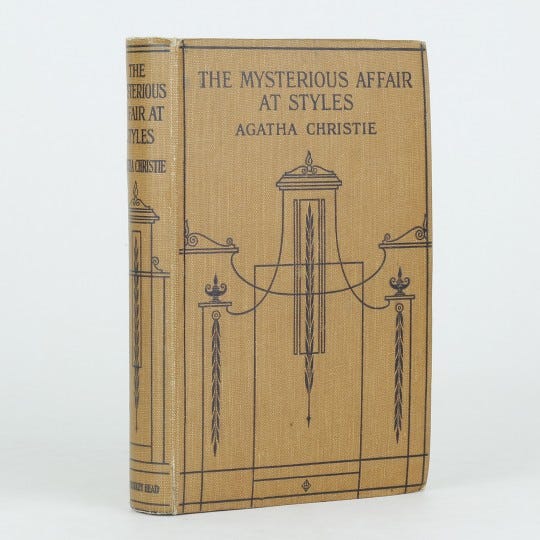Agatha Christie, Life Lesson #3. “I embarked lightheartedly”: Be Open to Challenges
What’s the last thing you did simply because someone dared you to do it? (Not stick your tongue to a frozen pole. We’re talking about interesting challenges.)
It might surprise you to know that Agatha Christie didn’t spend her younger years dreaming of being an author, aside from taking pleasure in the writing and publishing of a few early poems. If anything, music and drama were her early passions, but she didn’t consider herself talented enough to excel in those areas.
In fact, she often remarked on her lack of ambition.
But she was both open to suggestion and undaunted by the potential for rejection—a winning combination.
One winter’s day in her teen years, Agatha Christie was recovering from influenza. She was bored of reading and playing cards. Her mother suggested,
“Why don’t you write a story?”
“Write a story?”
“Yes,” said mother. “Like Madge.” [Agatha’s much older sister.]
“Oh, I don’t think I could.”
“Why not?”
There didn’t seem any reason why not, except that…
“You don’t know that you can’t,” mother pointed out, “because you’ve never tried.”
Christie’s mother left the room and returned in five minutes with a partly used exercise book. Two days later, when Christie had finished writing her story—a process she described as “exhausting” and “exciting”—her mother located Madge’s typewriter and urged Agatha to type up her completed work.
Agatha deemed her story derivative (perhaps a bit too influenced by the D.H. Lawrence novels she was reading at the time) yet she also thought it held promise. She kept writing stories and started sending them out to magazines. Why not?
“The stories all returned promptly with the usual slip: ‘The Editor regrets…’ Then I would parcel them up again and send them off to some other magazine. I also decided I would try my hand at a novel. I embarked light-heartedly. It was to be set in Cairo.”
In her autobiography, Agatha describes her early difficulty inventing characters and plots, but when she got stuck, “[I] turned to my other plot. This was more light-hearted, dealing with amusing characters.”
There’s that word, used twice in close succession: light-hearted.
Can we learn anything from Agatha’s willingness to try—but not necessarily worry, suffer, or put on airs—in the name of her art?
When Agatha found herself stuck again with this first novel effort, she merged the plots and brought the apprentice novel, called Snow Upon the Desert, to its conclusion.
With a family friend’s help, the novel was sent to a publisher who sent her a rejection letter full of “good advice,” then sent the novel onward to an agent, who also rejected it and recommended that Agatha work on a new book.
Both the editor and the agent encouraged her, in other words.
Yet Agatha seemed just as unprovoked by the praise as she was by the rejection. She loved the “one delicious moment” when she got an idea for a story and the early, confident stages of trying to execute it. But she considered writing no more important or creative than, say, embroidering cushions or “cooking interesting dishes.”
It took another dare, this time from her sister, to goad Agatha into thinking about novel writing again.
According to her autobiography, Agatha and Madge were discussing a detective story they’d read when Madge uttered the inciting words, “I don’t think you could [write a detective novel] … They are very difficult to do. I’ve thought about it.”
“I should like to try,” Agatha replied.
“Well, I bet you couldn’t.”
It was only later, during World War I, when Agatha was in her early twenties, married and volunteering for the war effort as a pharmacy assistant, that the detective-story dare came back to her. Unlike volunteer-nursing, which had kept Agatha frantically busy early in the war, pharmacy work had long slack periods. Entire afternoons would pass with nothing to do, surrounded by interesting pills and powders—and yes, poisons!1—an additional new catalyst to Agatha’s creativity.
The idea that would become Agatha’s first published book (which featured a poisoning, of course) grew only slowly, nurtured by those slack hours in the dispensary, plus time spent observing and eavesdropping on strangers in restaurants and on the tram. Both at work and at home with her mother (Agatha’s pilot husband Archie was away at war), Agatha became increasingly absent-minded, her brain pleasantly occupied by the character she was in the process of inventing, a fussy Belgian detective named Hercule Poirot.
Agatha managed to write half of the novel but was feeling stuck when her mother, practical as ever, casually suggested that she go away to a hotel to finish the manuscript.
“I thought about it. A fortnight quite undisturbed. It would be rather wonderful.”
One dare. A second dare. Natural incubation periods, including meaningful solitude unencumbered by family obligations. (Agatha missed Archie but she quite liked being a wartime volunteer, a role that exposed her to lots of interesting characters and fostered a sense of independence). Plus the support of family members who regularly encouraged Agatha to believe in herself and to take time to create. And all of it without excess striving or a strong desire for external validation. A detective story. Why not?
Agatha booked herself a room in a half-empty hotel in the moorlands, where she could spend hours walking and muttering to herself, solving the problems of her “over-complicated middle.”
Off the manuscript went, sometime later, to a publisher that rejected it. She’d expected that. Oh well! She sent it to another company, The Bodley Head, and in the two busy years that followed—including the end of the war, and the birth of a daughter, Rosalind—Agatha completely forgot about the manuscript
.
But then a letter arrived. The Bodley Head wanted to publish The Mysterious Affair at Styles.
Agatha had made the most of her mother’s suggestions and her sister’s dare. But more importantly—in fact, almost accidentally2—she had launched a promising career.
*At least 28 of Agatha’s novels would feature poisonings. Here’s to volunteering as research!
Agatha had no plans to write any more detective novels, which is why she didn’t pay much attention to the details of her publishing contract. Hmmmmm….(to be continued).






I feel like Agatha is speaking to me through you, telling me to chill the f out...
I love this backstory on Agatha Christie! I want to embrace her attitude about writing and life in general...